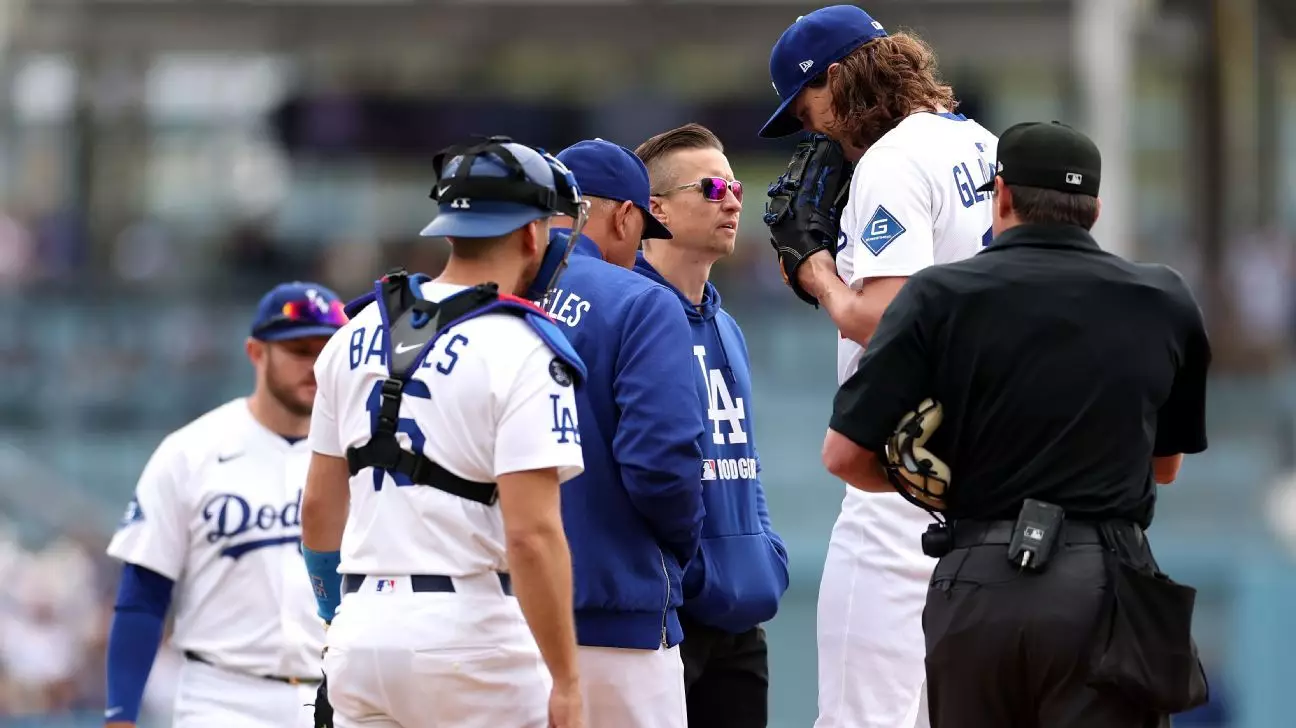The Los Angeles Dodgers find themselves navigating a turbulent sea of challenges just one month into the regular season. The news broke about Tyler Glasnow, the right-hander who recently joined the team, experiencing shoulder discomfort after an uninspiring outing against the Pittsburgh Pirates. Such injuries can drastically impact a team’s performance and morale; unfortunately, this is not new territory for the Dodgers. With their rotation already missing Blake Snell due to shoulder inflammation, fans and coaches alike are left to question the fragility of their pitching lineup as they prepare for a critical series against the Miami Marlins.
The grave implications of a pitcher’s injury are compounded when two starters are struggling simultaneously. Glasnow’s early exit from the game, marked by the disappointment of back-to-back home runs and a shaky start, adds salt to the wound. It’s reminiscent of a tragic narrative where hope and high expectations clash with the harsh realities of the sport—athletic prowess frequently muted by the constraints of the human body.
The Challenge of Recovery
Glasnow’s frustration, echoed in his candid reflections post-game, reveals the emotional toll that comes with injury. “I’m just obsessed with trying to figure out what’s going on,” he stated, revealing the psychological burden often overlooked in sports narratives. His potential to shine has been persistently clouded by injuries; he has a painful history that includes significant elbow injuries and the infamous Tommy John surgery that limited his starts over the past few seasons. This anxiety about health can discourage even the most talented athletes. Rather than merely managing bumps and bruises, they must wrestle with the competing desires of ambition and vulnerability.
Adding to the conundrum is the uncertainty surrounding the need for further MRIs. While Glasnow’s team has opted to avoid additional imaging for the time being, the looming possibility of an injury list stint casts a long shadow. Manager Dave Roberts discussed the critical necessity for Glasnow to return to form, stating the truth many within the organization must grapple with: without full health, the potential for greatness is reduced to mere hopes and dreams.
Adapting and Overcoming
With injuries redefining the pitching rotation, the Dodgers face a pivotal moment. As Roberts confirmed, the team must now channel its efforts into creatively managing a depleted roster. Enter right-hander Tony Gonsolin, who is set to make his return after a lengthy rehabilitation phase. The urgency of his comeback highlights a broader theme within professional sports: adaptability in challenging circumstances often separates the good teams from the great ones.
This adaptability is crucial as the Dodgers are left to rely on their bullpen to step up to the challenge during Glasnow’s potential absence. The game against the Marlins will require not just preparation but also a fierce determination to overcome adversity. The camaraderie that develops during such testing times can often lead to unexpected team bonding and resilience. Other players must rise to the occasion, turn potential setbacks into comebacks, and rally around one another in solidarity.
The Weight of Expectations
As a Los Angeles team, the Dodgers carry not only the burden of injuries but also the inexorable weight of expectations. Fans expect excellence, informed by the franchise’s storied history and high-profile acquisitions. Glasnow’s struggles, therefore, echo a deeper reality—the pressure to perform can sometimes overshadow individual health, potentially leading players to push their limits at the expense of long-term wellness.
It is crucial to remember that while the game captivates millions, it also comes with its fair share of heartache. The public often skips ahead to analysis of statistics, wins, and losses, neglecting to appreciate the toll each game takes on athletes’ bodies and minds. Glasnow’s feelings of frustration are a reminder of this human element behind the machinery of professional sports.
In this landscape, the Los Angeles Dodgers stand at a crossroads. Their story is one of resilience forged in the heat of a crucial season fraught with uncertainties. It serves as a powerful reminder that in the theater of baseball, the individual’s struggle for health and performance can often mirror the journey of the team—a narrative filled with hopes, challenges, setbacks, and, hopefully, triumphs.

